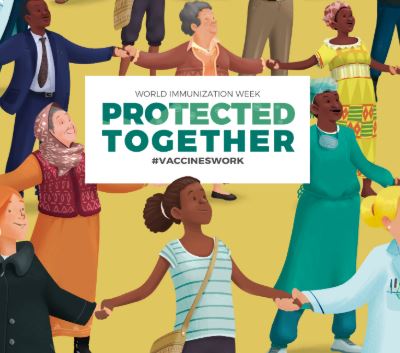World Immunization Week 2020 – #VaccinesWorkForAll
(Cut Down the Millions!)

Traditionally celebrated over the years every last week of April, World Immunization Week continues to encourage the use of vaccines to protect everyone, both young and old, against diseases. No gainsaying about the fact that immunization has been a life saver of humanity since the 1790s when Edward Jenner created the first world’s vaccine for smallpox and till date, neither can we dispute that it has proven to be one of the world most successful and most formidable approach in tackling diseases that were once a nightmare.
Vaccines save lives; fear endangers them. It's a simple message parents need to keep hearing.
Are you even aware that immunization prevents 2-3 million deaths every year? That's impressive right?
Expectations for 2020 campaign underscore the need for more commitment and greater sense of obligation around immunization and press home the essence of vaccination in promoting the health and overall well-being of everyone, wherever on the globe, throughout life.
Nigeria's effort towards combating Polio is noteworthy as report has it that there has been no Wild Polio Virus 1 (WPV1) detected for the past three years in Nigeria. However, there is still a large room for improvement. The World Health Organization (WHO) reveals how urgent the improvement is based on its 2019 report where Nigeria ranked among the top 10 countries that presents poor immunization coverage. Ngozi Akwataghibe pointed out some common underlying factors responsible for this in her study 'Exploring Factors Influencing Immunization Utilization In Nigeria', which are unavailability of vaccines at the scheduled times, shortage of health workers, indirect cost of immunization such as logistics and illegal charges by health workers. Another study pinpointed ethnicity (culture and customs) and religious beliefs as serious challenges causing setbacks for the National Programme on Immunization (NPI).
Nonetheless, relentless enlightenment is key to overcoming some of these factors underlying poor immunization coverage in Nigeria. For immunization to be totally successful in Nigeria, agencies and organizations must work in synergy with community leaders and clerics in various communities. We must start by identifying those areas where positive response to immunization has been very low, and educate people on the benefits of immunization and the dire consequences of not getting their subjects vaccinated. More importantly, immunization should be everyone's business. Everyone, that is, the government, health workers, parents, youths and the citizenry at large. This therefore calls for the need for agencies like the National Orientation Agency, the media houses (public and private) and other stakeholders in the health sector to fill in this gap by giving proper orientation and sensitization to the general public on the need for immunization.
The WHO recommends that countries should expand immunization services beyond infancy. Adults don't outgrow vaccines. Adult vaccination should be seriously addressed too. Adults can get vaccinated against diseases such as Human Papillomavirus (HPV), meningococcal disease, hepatitis A, hepatitis B, chickenpox, measles, mumps and rubella.
There are still nearly 20 million children in the world today who are not getting the vaccines they need. 4.3 million of the 7 million children born in Nigeria every year fail to get fully vaccinated before their first birthday.
Every Nigerian child is our No. 1 stakeholder at TNCI and their well- being is our topmost priority. In lieu of this TNCI will be lending her voice on #VaccinesWorkforAll campaign through social media and other online platforms to sensitize her teeming audience on the need to prioritize vaccination for all children who are of age. Some of this involves sharing educating materials on popular vaccines like Tetanus, Polio, Chicken pox etc. In addition, well-known doctors – Dr. Olufunmilayo Harvey, Dr. Aproko and Dr. Chioma Nwakanma (Dr. Zobo) - who use social media to amplify health related discourse will be engaged to discuss Human PapillomaVirus (HPV), Vaccine Hesitancy, as well as debunk myths about vaccines.
As we join the rest of the world in celebrating the World Immunization Week, we reach out to the government, other associated agencies and stakeholders in the health sector (public and private), parents and caregivers to cut down the millions. We can start NOW!